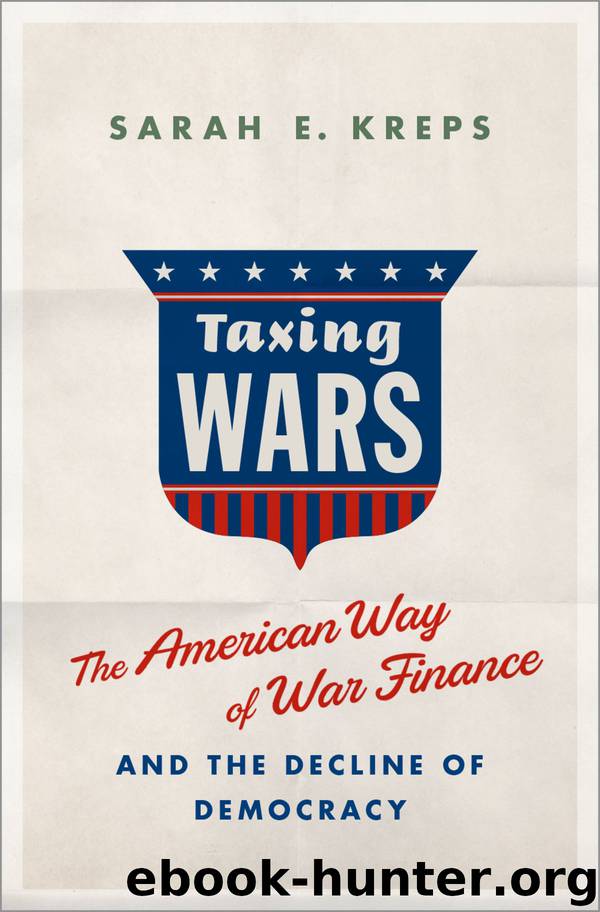Taxing Wars by Kreps Sarah;

Author:Kreps, Sarah;
Language: eng
Format: epub
Publisher: Oxford University Press, Incorporated
Published: 2018-07-27T16:00:00+00:00
Consequences of a War without Apparent Costs
Afghanistan was often labeled the “good war” as Obama had called it, legitimate and necessary when contrasted with the Iraq War, and less of a magnet for criticism, scrutiny, or protest.78 High-profile groups such as Moveon.org had not taken an early position on the Afghanistan War; veterans groups such as Iraq Veterans against the War had been focused just on the Iraq war—shifting their focus only in the fall of 2009 when discussions about the Afghanistan surge started; and groups such as US Labor against the War had considered “the war” to be Iraq, also arriving belatedly in its opposition to Afghanistan.
In 2009, anti-Afghanistan messages did gain momentum, with marches in Washington for October to coincide with Obama’s Afghanistan review and the eighth anniversary of the beginning of the war.79 Those marches corresponded with the question of costs taking center stage politically in the fall of 2009. Not only was Congress debating a war tax, but the White House was about to deploy 30,000 more troops to Afghanistan and double down on its commitment, increasing the level of financial resources in ways that the war had never seen. Discussion of these costs quickly faded to the political background, however, thwarting any robust or sustained anti-war movement.
Costs of the Afghanistan War were not a visible lightning rod for protest activity as they became in Vietnam with the war tax alongside increasing casualties, and President Obama certainly benefited from asymmetric partisan advantages. Polls taken just after the president announced the surge decision showed that 50% of the public supported sending more troops to Afghanistan, compared to 35% who preferred fewer troops.80 Republicans were inherently supportive of the more robust defense posture, so he had their support, and Democrats were more likely to side with him out of a sense of partisan loyalty. Indeed, demographic analysis of support for the surge in a December 16–20, 2009, poll suggests that a larger percentage of Americans who disapproved of the way Obama was handling his job as president were inclined to favor his decision to send more troops (see Table 6.1).81
Further analysis resolves the apparent paradox, showing that 74% of Republicans supported the decision to send 30,000 more troops, compared to 61% of Independents and 50% of Democrats (Table 6.2).
Download
This site does not store any files on its server. We only index and link to content provided by other sites. Please contact the content providers to delete copyright contents if any and email us, we'll remove relevant links or contents immediately.
The Secret History by Donna Tartt(18083)
The Social Justice Warrior Handbook by Lisa De Pasquale(11941)
Thirteen Reasons Why by Jay Asher(8416)
This Is How You Lose Her by Junot Diaz(6411)
Weapons of Math Destruction by Cathy O'Neil(5800)
Zero to One by Peter Thiel(5461)
Beartown by Fredrik Backman(5304)
The Myth of the Strong Leader by Archie Brown(5217)
The Fire Next Time by James Baldwin(4998)
How Democracies Die by Steven Levitsky & Daniel Ziblatt(4940)
Promise Me, Dad by Joe Biden(4899)
Stone's Rules by Roger Stone(4833)
100 Deadly Skills by Clint Emerson(4661)
Rise and Kill First by Ronen Bergman(4536)
A Higher Loyalty: Truth, Lies, and Leadership by James Comey(4532)
The David Icke Guide to the Global Conspiracy (and how to end it) by David Icke(4359)
Secrecy World by Jake Bernstein(4354)
The Farm by Tom Rob Smith(4305)
The Doomsday Machine by Daniel Ellsberg(4233)
